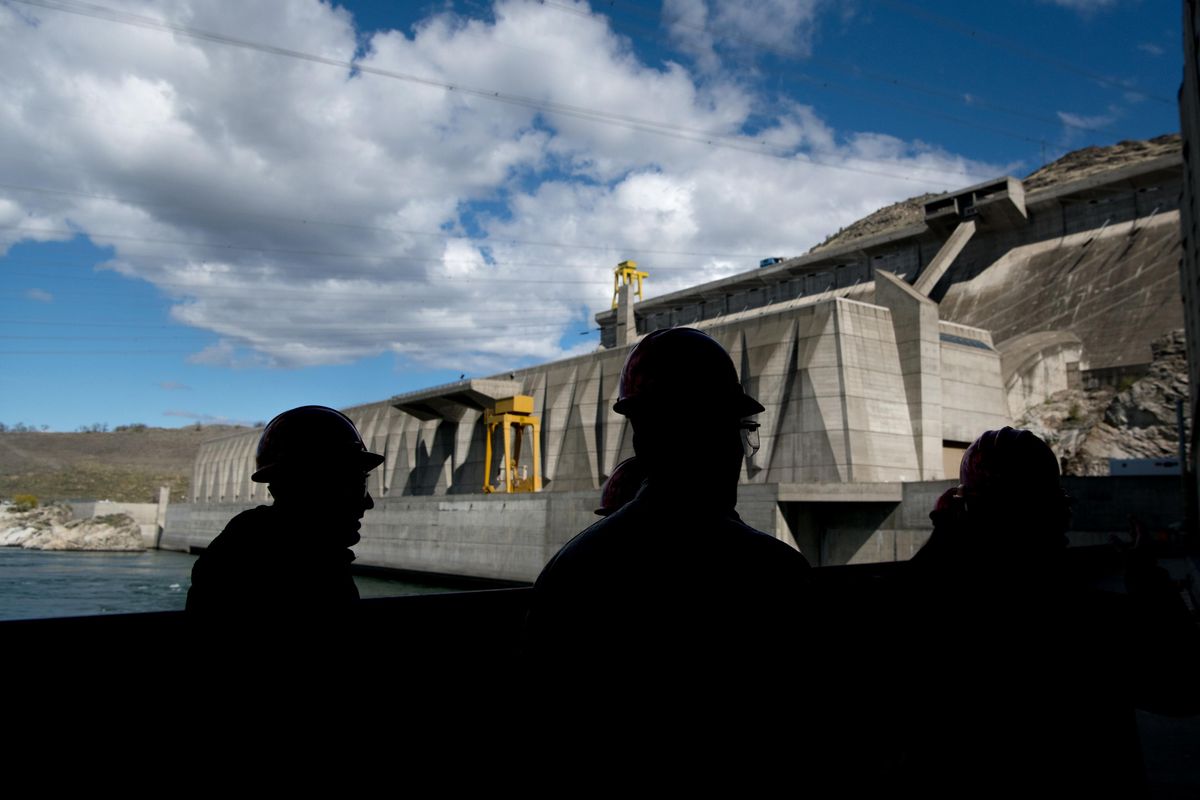Georgian engineers from Enguri Dam get break from Russian conflict at Coulee Dam tour

COULEE DAM, WASHINGTON – One of the world’s tallest hydroelectric dams is in the country of Georgia, a former Soviet state on the Black Sea.
Enguri Dam, a concrete arch 891 feet tall and 2,388 feet wide, was built on the orders of Soviet leader Nikita Khrushchev, and first became operational in 1978. It’s an engineering marvel and remains the largest source of electricity in Georgia.
But since the collapse of the Soviet Union in 1991, the dam has fallen into disrepair and become the center of a complex geopolitical conflict involving Georgia, Russia and a Kremlin-backed separatist region, Abkhazia.
This week, a small group of engineers and supervisors who run Enguri Dam are in Spokane to learn about the United States’ energy industry and regulatory system.
With hosts from the Community Colleges of Spokane, the group is visiting local leaders and nearby hydropower facilities as part of a federal exchange program called Open World, which aims to “introduce rising leaders of emerging countries to the importance of legislative functions in creating and sustaining democracies.”
Hadda Estrada, dean of global education and strategic partnerships at CCS, said she has hosted two other groups through the Open World program in recent years, mostly young professionals looking to make a difference in their home countries.
Tuesday’s destination was Grand Coulee Dam, where the Georgian group got an in-depth look at the massive concrete facility that harnesses the power of the Columbia River.
During an informational meeting with Grand Coulee Dam supervisors, Ivane Pirveli, a Georgian energy consultant who works with the U.S. Agency for International Development, or USAID, explained the crux of the conflict surrounding Enguri Dam. The dam itself is in Georgian-controlled territory, while its main powerhouse is across a tightly secured “artificial border” in Abkhazia, he said.
Abkhazia and another breakaway region, South Ossetia, are home to ethnic minorities and have had tense relations with the Georgian government since the downfall of the Soviet Union. Russia, meanwhile, has recognized their independence and stationed armed “peacekeepers” around their borders, Pirveli said.
A five-day conflict in those territories in 2008, which killed 844 people and wounded more than 2,000 others, remains under investigation by the International Criminal Court at the Hague, with both sides accused of war crimes.
The Georgian government has been footing the bill for electricity that Enguri Dam supplies to Abkhazia, even though the region has not privatized its power grid like the rest of the country, and its usage has increased as Russian soldiers and their families moved in.
“The bottom line is that the dam is a focal point for cooperation between Georgia and Abkhazia,” Pirveli said. The best solution, he said, would be “for the Russians to go away.”
While their trip to Eastern Washington probably won’t offer a quick resolution to the conflict with Russia, some of the Georgian delegates said it was eye-opening to witness the scale and detail of the operations at Grand Coulee Dam.
“In Georgia we have a saying,” Davit Morgoshia, who heads the team that monitors Enguri Dam for potential damage, said through an interpreter. “It’s good to hear. It’s better to see.”